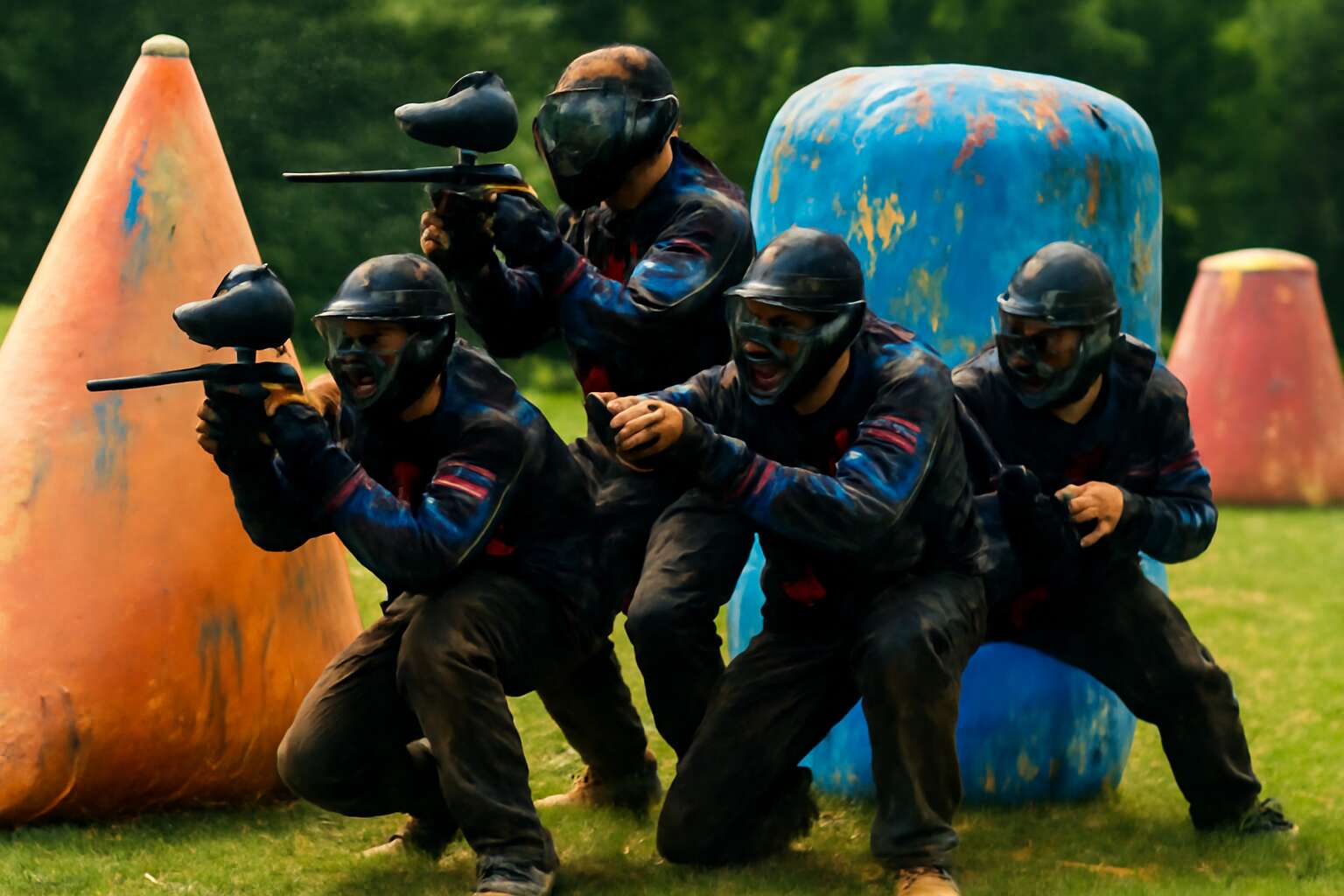Historical Origins of Paintball
Early Development and Inception – Tracing the roots of paintball technology and its initial concepts
In the labyrinth of human ingenuity, few inventions carry the silent poetry of paintball’s origins, a dance of technology and sport that emerged from a desire for adrenaline-fueled camaraderie. The question lingers—why was paintball invented? Its roots stretch back to the early 1970s, a time when pioneers sought an innovative way to simulate combat without the chaos of real warfare. Initially, the technology was conceived as a means of marking trees and cattle, transforming simple ideas into tools of experimentation and play.
From these humble beginnings, the concept evolved, driven by a craving for strategic challenge and physical engagement. The early development of paintball technology was marked by the creation of special markers and capsules—tiny orbs filled with biodegradable paint—designed to leave a visible mark without injury. This ingenuity laid the foundation for what would become a worldwide phenomenon, satisfying a primal instinct for competition and adventure. Understanding why was paintball invented reveals a story of innovation bridging the gap between military simulation and recreational sport, echoing humanity’s timeless pursuit of thrill and discovery.
Influences from Military and Tactical Training – How military simulations and training influenced paintball’s creation
In the shadowed corridors of military strategy, a silent revolution was brewing—one rooted in the quest for realism without the ravages of war. The origins of paintball are inextricably linked to military and tactical training, where simulation became a vital tool for preparing soldiers for combat scenarios. These early military experiments sought safer, cost-effective ways to hone skills and foster teamwork, laying the groundwork for what would become a recreational phenomenon.
Military leaders recognized that immersive training could elevate readiness, leading to the development of systems that mimicked battlefield conditions. The influence of these tactical exercises is evident in the creation of specialized markers and capsules designed for safe, yet authentic simulation. This blending of military ingenuity and sport raises a compelling question: why was paintball invented? It was born from the desire to replicate the chaos and strategy of warfare in a controlled environment, satisfying a primal human instinct for competition and survival.
Furthermore, the evolution of paintball technology was propelled by the need for effective military training tools. As the concept matured, it became clear that these systems could serve dual purposes—training soldiers and engaging civilians in adrenaline-driven sport. This duality is reflected in the list of influences that shaped paintball’s development:
- Realistic military combat simulations
- Cost-effective training mechanisms
- Team-building exercises for armed forces
- Safe, non-lethal methods to practice tactics
Understanding why was paintball invented reveals a layered history—one where the boundaries between military necessity and recreational pursuit blur, driven by the universal human desire for challenge, connection, and discovery.
The Role of Marker Technology and Innovations – Development of paintball markers and their impact
The development of paintball markers is a fascinating tale of innovation driven by necessity and a dash of ingenuity. Once upon a time, these markers were simple, crude devices—more akin to garden sprayers than the sleek, high-tech equipment we see today. The question of why was paintball invented often leads back to these humble beginnings, where practicality trumped perfection. Early markers were designed to reliably shoot capsules filled with paint, transforming a basic concept into a viable sport and training tool.
As technology advanced, so did the markers. Innovations like compressed air systems, improved accuracy, and ergonomic designs turned paintball markers into precision instruments. These improvements didn’t just make the game more fun—they amplified its realism, making it a favorite among military and tactical enthusiasts. Interestingly, the evolution of marker technology also spurred the growth of the sport itself, broadening its appeal beyond military simulations to include recreational players seeking adrenaline and challenge. The question of why was paintball invented? It’s clear that technological progress was central in transforming a military training device into a mainstream activity enjoyed worldwide.
- Enhanced safety features to reduce injuries
- More accurate shooting mechanisms for realism
- Portable, lightweight designs for ease of use
- Versatile systems adaptable to different game scenarios
Reasons Behind the Invention of Paintball
Recreation and Entertainment Purposes – Creating exciting and engaging outdoor activities for fun
In the vibrant tapestry of recreational pursuits, paintball emerged as a dazzling thread—an invention born from a desire to craft exhilarating outdoor activities that ignite the spirit of adventure. The question of why was paintball invented often circles around the craving for a game that combines strategy, adrenaline, and camaraderie in a way that feels both primal and playful. It was designed to be more than just a pastime; it became a canvas for imagination to run wild, transforming mundane surroundings into dynamic battlegrounds that challenge both mind and body.
This innovative activity was fueled by a quest for entertainment that pushes boundaries while remaining safe. Its creation answered a call for engaging activities that could captivate diverse age groups, offering a thrilling escape from the ordinary. As players chase victory, they also forge bonds, making paintball a staple in the realm of adventure sports. This desire to craft fun-filled, outdoor entertainment experiences underpins the very essence of why paintball was invented, shaping it into the compelling sport it is today!
Team Building and Corporate Events – Using paintball as a tool for leadership and teamwork development
Companies in South Africa and around the world have long recognized the power of team building activities. Among these, paintball stands out as a dynamic tool for leadership and teamwork development. Its high-energy, strategic nature encourages participants to communicate clearly and make quick decisions under pressure. This makes paintball an ideal activity for corporate events that aim to foster collaboration and trust.
Understanding why was paintball invented reveals its original purpose: to create engaging, outdoor entertainment. But over time, it has evolved into more than just fun. Many organizations now use paintball as a way to challenge employees, enhance problem-solving skills, and build camaraderie. It’s not just about shooting paint; it’s about learning to work together amidst adrenaline and excitement.
In fact, many South African companies incorporate paintball into their leadership training programs. The activity’s competitive yet safe environment allows teams to push boundaries while forging stronger bonds. The engaging nature of paintball makes it a memorable experience that promotes communication, resilience, and strategic thinking—key qualities in any successful team.
Military and Police Training Applications – Simulating combat scenarios for training law enforcement and armed forces
The strategic and adrenaline-fueled nature of paintball has made it an invaluable tool beyond mere recreation. When exploring why was paintball invented, it’s fascinating to discover its critical role in military and police training applications. During high-stakes scenarios, officers and soldiers must make quick decisions under pressure—something that traditional simulations often struggle to replicate.
Paintball provides a safe yet realistic environment to simulate combat situations. Its use of non-lethal, brightly colored projectiles enables trainees to experience the chaos and urgency of real encounters without risking serious injury. This immersive experience sharpens tactical thinking, enhances decision-making skills, and boosts situational awareness.
- Realistic scenario simulation
- Safe environment for high-pressure training
- Cost-effective alternative to live ammunition
- Promotes teamwork and strategic planning
Because of these advantages, many armed forces and law enforcement agencies in South Africa and around the world incorporate paintball into their training programs. The activity’s capacity to mimic combat scenarios with precision makes it more than just a game—it’s a vital component in preparing personnel for real-world challenges. So, understanding why was paintball invented reveals its evolution from entertainment to an essential tactical resource.
Sport and Competitive Play – Designing a physically active sport that encourages strategic gameplay
The inception of paintball as a sport was driven by a desire to create a dynamic, physically active game that marries strategy with adrenaline. Unlike many recreational activities, paintball pushes players to think quickly and act decisively, making it a compelling blend of sport and tactical challenge. The core reason behind why was paintball invented was to develop a competitive activity that encourages strategic gameplay while promoting physical fitness and teamwork.
Designing a sport rooted in tactical thinking, paintball offers players an immersive experience that combines outdoor adventure with mental agility. Its competitive nature fosters camaraderie and sharpens problem-solving skills, making it popular not just for entertainment but also for corporate team-building events. In essence, the game was crafted to be both physically demanding and mentally stimulating, ensuring that players remain engaged and challenged at every turn.
- Encourages strategic planning under pressure
- Promotes active outdoor participation
- Fosters teamwork and leadership skills
- Provides a safe yet intense competitive environment
Over time, these qualities have helped paintball evolve from a simple recreational pastime into a widely recognized sport, especially in regions like South Africa, where outdoor activities thrive amidst natural beauty. The question of why was paintball invented continues to resonate, revealing its purpose as a game designed not just for fun but to challenge the mind and body in equal measure.
The Evolution of Paintball as a Sport
Transition from Military Simulations to Commercial Markets – How paintball shifted from tactical training to entertainment
As the vibrant tapestry of recreational history unfolds, few stories are as captivating as the evolution of paintball from a serious military training tool into a beloved sport and entertainment phenomenon. The question of why was paintball invented often sparks curiosity, but its transformation reveals a fascinating journey rooted in innovation and necessity. Originally conceived as a method to simulate combat scenarios with precision, paintball’s core purpose was to provide a safe yet realistic way for soldiers and law enforcement to hone their tactical skills.
Over time, the utilitarian roots of paintball gradually gave way to an entirely new realm—one where the thrill of strategy, speed, and teamwork could be enjoyed by enthusiasts far beyond the battlefield. The advent of paintball markers, combined with the desire for engaging outdoor activities, propelled the sport into recreational markets. Today, paintball stands as a testament to how a tool designed for tactical training seamlessly transitioned into a globally cherished sport, captivating millions with its blend of adrenaline and camaraderie.
Standardization of Rules and Equipment – Development of official game regulations and gear
As paintball’s story unfolds, a pivotal chapter reveals the meticulous craftsmanship behind transforming a rugged military training tool into an organized, exhilarating sport. The evolution of paintball as a sport is marked by the standardization of rules and equipment, a process that elevated the game from informal chaos to a structured competition embraced worldwide. This transition was driven by the need for fairness, safety, and consistency—elements essential to fostering a thriving community of enthusiasts and professionals alike.
Official game regulations emerged gradually, establishing guidelines on gameplay, safety protocols, and fair play, ensuring that players across different regions could unite under a common banner. Concurrently, the development of specialized gear—such as paintball markers, protective masks, and tactical vests—redefined the playing field. These innovations not only enhanced safety but also added a layer of precision and realism, making every match a symphony of strategy and adrenaline.
Today, the standardization of equipment and rules underscores why was paintball invented—to create a safe yet thrilling environment for tactical skill, teamwork, and competitive spirit. As the sport continues to evolve, it remains rooted in its origins, where innovation and discipline intersect to craft an experience that captivates millions, transcending its humble beginnings.
Growth of Paintball Communities and Leagues – Fostering competitive play and organized tournaments
As paintball’s vibrant tapestry unfurled across the global landscape, its evolution from clandestine military training tool to exhilarating sport is nothing short of legendary. The growth of paintball communities and leagues has transformed the game into a competitive arena where skill, strategy, and camaraderie collide in bursts of color and adrenaline. Today, organized tournaments draw thousands of enthusiasts, each vying for glory in meticulously crafted battlegrounds that test their tactical prowess.
This surge in popularity was fueled by a desire to foster a sense of unity and challenge among players, creating an environment where fierce competition and teamwork thrive side by side. For many, paintball is more than just a game; it’s a cultural phenomenon that champions innovation and discipline. The question of why was paintball invented remains rooted in this quest for a safe, engaging outlet for strategic combat, where physical agility and mental acuity are equally prized.
Impact of Paintball’s Invention on Society
Promoting Active Lifestyle and Outdoor Recreation – Encouraging physical activity through paintball games
Paintball’s invention didn’t just revolutionize outdoor recreation; it also sparked a cultural movement promoting an active lifestyle. With adrenaline-pumping games that demand agility, strategy, and teamwork, paintball encourages players to ditch the couch and embrace the great outdoors. As a dynamic activity, it fosters physical fitness while delivering a healthy dose of fun and camaraderie.
In South Africa, this sport has become more than just a pastime—it’s a way to connect with nature and stay active. The thrill of dodging paintballs and strategizing with teammates energizes players of all ages. Why was paintball invented? Its roots in military simulations and tactical training naturally transitioned into a recreational activity that champions physical activity and outdoor recreation. Whether on rugged terrains or purpose-built fields, paintball cultivates a community that values fitness, adventure, and social bonding.
Enhancing Teamwork and Strategy Skills – Developing soft skills in participants
The invention of paintball has had a profound impact on society, particularly in fostering vital soft skills such as teamwork and strategic thinking. When players engage in paintball games, they are compelled to communicate effectively, trust their teammates, and adapt swiftly to dynamic situations. These skills extend beyond the field, enriching personal and professional lives alike.
In fact, paintball’s roots as a military simulation tool have played a significant role in its ability to develop leadership qualities and tactical awareness. Participants learn to assess risks, coordinate under pressure, and devise strategies—capabilities that are highly valued in corporate environments and community initiatives. This makes paintball more than just recreation; it’s a platform for cultivating resilience and social cohesion.
Furthermore, the competitive nature of paintball encourages players to think critically and make quick decisions. Whether on rugged terrains in South Africa or urban-inspired fields, the sport’s emphasis on strategy enhances cognitive agility. As a result, paintball has become a catalyst for societal growth, building bridges through shared experience and cooperative challenge.
Contributing to Business and Industry Growth – Economic impact on sports facilities, equipment manufacturers, and events
The invention of paintball sparked a ripple effect that transformed industries and invigorated local economies across South Africa. From bustling sports facilities to innovative equipment manufacturers, the demand for paintball-related products and services continues to surge. This dynamic industry not only caters to recreational enthusiasts but also fuels the growth of a thriving business ecosystem. As paintball gained popularity, it created a fertile ground for entrepreneurs and investors eager to capitalize on its expanding market.
Moreover, major paintball events and tournaments have become significant economic contributors. They attract visitors from across the country and beyond, boosting tourism and hospitality sectors. The proliferation of these events necessitated specialized gear, leading to advancements in paintball marker technology and equipment manufacturing. This technological evolution enhanced gameplay experience, making the sport more accessible and engaging for players of all skill levels.
In essence, the question of why was paintball invented extends beyond mere recreation—it is a catalyst for economic growth and community development. The industry’s expansion demonstrates how a simple concept can evolve into a multifaceted enterprise contributing substantially to local industry vitality and employment opportunities. The story of paintball’s rise reveals a fascinating intersection of innovation, entertainment, and economic resilience, propelling South Africa’s sporting landscape into new realms of possibility.




0 Comments